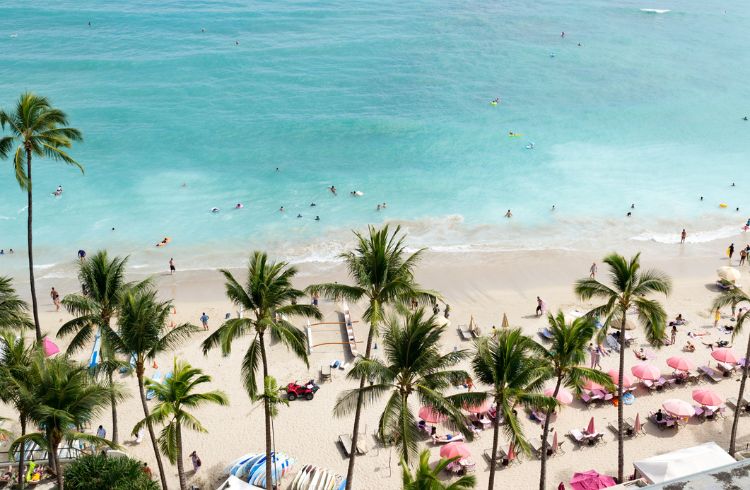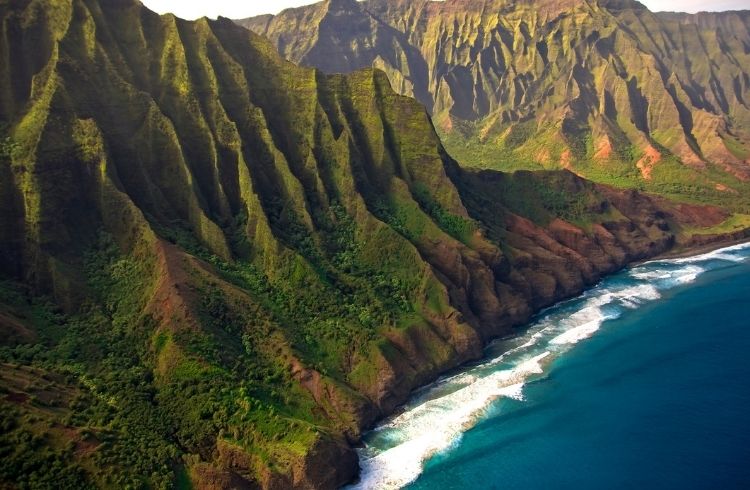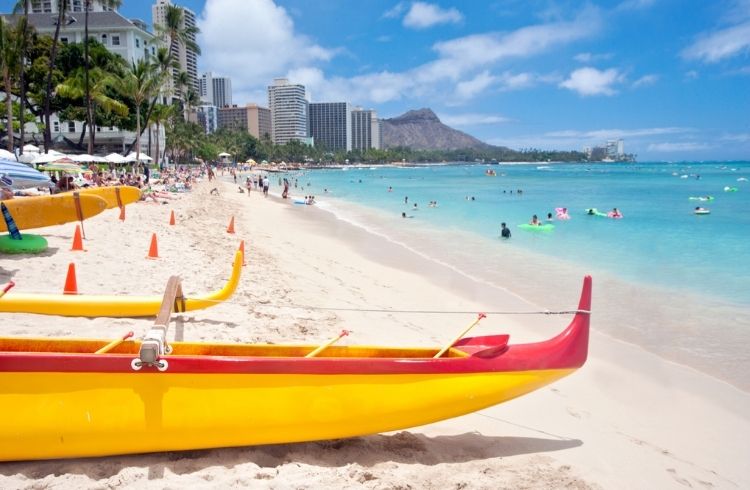Travel insurance when visiting Hawaii
Stunning scenery, top surf spots, mountainous rainforests, and a laid back lifestyle. Say Aloha to Hawaii!
- As featured in:
As featured in:
Aloha! It’s time to put the Irish weather in the rear-view mirror and get ready for a sunny adventure in Hawaii. Whether you’re planning to hike the rugged Kalalau Trail on Kauai, or a more sedate saunter to the Blue Room (also known as Waikapalae), Hawaii will restore that Irish winter pallor to a healthy glow in no time.
- What’s Covered?
- Why do I need travel insurance when visiting Hawaii?
- What to look out for when travelling around Hawaii
- What’s not covered?

What’s Covered?
Of course, whenever we plan a holiday, we hope everything goes smoothly, but that isn’t always the case. The right insurance can come in handy when a hiccup, or something more serious, interrupts your holiday.
World Nomads has two levels of cover – Standard and Explorer – they offer different benefits, limits, and sub-limits, so it’s best to compare them. For Irish travellers with their sights set on Hawaii, our policies include cover for:
- Emergency overseas medical and dental: One of the main reasons travellers buy insurance is for medical cover. Travelling to a country such as the US, where there is no reciprocal healthcare agreement in place, health costs can quickly become exorbitant.
- Emergency medical evacuation: if you are injured and require emergency transport to the nearest hospital via ambulance or helicopter, then the transportation costs may be covered. You will need to check with our 24/7 Emergency Assistance Team first.
- Extended stays: you may extend your travel insurance policy past the expiration date if you’re planning to stay longer in Hawaii. This will need to be done prior to the current expiration date of your policy and can be extended up to 12 months from the start date of your policy.
All our Standard and Explorer plans will offer cover for emergency overseas dental and medical assistance, medically necessary evacuation and repatriation if you get sick or die from COVID-19 while travelling overseas. The difference will often be the excess or the maximum payable limit.
World Nomads travel medical insurance can cover expenses such as:
- Hospitalisation
- Out-patient treatment (no hospital admission)
- Prescribed medicines
- Transport to get you home for ongoing treatment if it’s decided that it’s medically necessary.
- Cover for some Coronavirus-related events: to find out what cover applies to you, read our What’s Covered for Coronavirus article, which has all of the details, including benefit limits and exclusions
Here are some of the highlights of our coverage, depending on the plan you’ve selected:
- Activities: World Nomads has cover for more than 150 activities, sports and experiences. For those considered higher risk you may be asked to upgrade your cover or pay an additional premium. When participating in an activity, always act sensibly, use safety equipment, and undergo the required training.
- Lost or delayed bags: You saw your bags get tagged and loaded onto the conveyor at Dublin, but when you landed in Hawaii you found yourself watching an empty luggage carousel. Travel insurance can help with delayed or lost luggage. The first step is always to report it immediately to the airline carrier and get everything in writing, making sure you keep copies. If your bags are delayed longer than 12 hours you may be able to claim for basic necessities, such as a toothbrush, clean underwear, to tide you over until your bags can begin their holiday with you.

Why do I need travel insurance when visiting Hawaii?
While stunning scenery abounds, travel to any country does bring a level of risk and Hawaii is no different. The Hawaiian Islands can be exciting and fun, particularly for those seeking an adventurous getaway but it’s important to be sensible about the level of risk and the type of activity and sports coverage you may need.
While making your dive plan, it’s important to also think about your insurance, in case something goes wrong (which can happen, even to the most experienced divers). When getting the right scuba diving level of insurance, you’ll need to know the depth you’re diving, your level of dive qualifications and you may be required to dive only under constant supervision.
If you’re planning on some tropical scuba diving, just know that solo diving, cave diving or any dive below 30 metres (or 50 metres if the appropriate premium has been pad) is not covered.
Always check your Policy Wording carefully to make sure all your chosen activities are covered. You may need to upgrade your level of cover for a specific activity when you purchase.
What to look out for when travelling around Hawaii
One of the reasons Hawaii is so exciting is that it’s so different to home. No persistent cloud cover or gently rolling hills. It can be steamy and hot, with rugged, sometimes explosive, terrain. This can affect the type of cover you choose.
Natural catastrophes, such as volcanoes, tropical thunderstorms, and even cyclones and tsunamis, are known to happen in Hawaii. If you find that you cannot use your booked accommodation because of a natural catastrophe, the Explorer Plan may cover you for reasonable additional accommodation and transport costs. The Standard Plan does not offer coverage for natural catastrophes.
Kayaking on the Wailua River, Hawaii’s only inland river, is a relaxing way to spend a few hours as you paddle upstream, before hiking to a stunning secluded waterfall. However, if your kayak capsizes (the most common kayaking accident) and you hurt yourself as you get flipped into the water, travel insurance may be helpful in getting medical costs covered. Kayaking is a Level 1 activity and is covered in both the Standard and Explorer policies, but make sure you read the safety information to ensure you comply.

What’s not covered?
When taking out insurance, understanding what’s not covered is just as important as what is covered. Every policy is different, so make sure you read the wording carefully.
- If you are under the influence of drugs or alcohol you won’t be covered for any accidents.
- Whenever participating in any kind of sports, if you don’t follow all safety measures, such as wearing a helmet or wearing full safety harness where required, you may not be covered.
- Loss or damage to luggage due to age, wear and tear, loss of value. Damage to sporting equipment caused while in use.
- Pre-existing medical conditions as explained in the Policy Wording.
- Travelling to, planning to travel to, or choosing to remain in a country or region that is the subject of a government Do Not Travel or Avoid Non-essential Travel warning.
- Change of mind, disinclination, or reluctance to travel.
This is only a summary of coverage and does not include the full terms, conditions, limitations, and exclusions of the policy. You should read your Policy Wording in full, so you understand what is and isn’t covered. That way there won’t be any surprises if you need to use it. If you have any questions, please get in touch.
Travel insurance tip 1: to have cover for an adventure sport or activity, you may need to add it to your policy or select a plan with more coverage when you buy and pay the extra premium. Remember, you can’t upgrade your coverage after you buy, so it’s important to get this right on the first go.
Travel insurance tip 2: always make sure you’ve done your research on not just on Hawaii, but each of the countries you’re planning to visit as there may be Irish government-imposed travel restrictions in place. If you decide to travel to a country on a ‘Do Not Travel’ or "Avoid Non-essential Travel' list, then your World Nomads policy will not provide cover for the reasons outlined in the warning. The Ireland Department of Foreign Affairs (DFA) currently advises to avoid non-essential travel to some countries and territories due to coronavirus (COVID-19) risks. You can look up DFA foreign travel advice here, and read the DFA’s COVID-19 travel advice by clicking here.
Travel Insurance Benefits: how we can take care of you
Trip Cancellation
Been working hard for your trip?
We'll work hard to protect it.
Trip Protection
- Unexpectedly hospitalised?
- Travel buddy unfit to travel?
- Been made redundant?
We’ve got your back.
Emergency Medical Expenses
Feeling fit and healthy? What if you get sick or injured?
Take the pain out of medical or dental costs.
Emergency Medical Insurance
- Need meds quick?
- Accidentally injured?
- Suddenly sick?
We’ve got your back.
Emergency Medical Transportation
Know where the nearest suitable medical facility is?
Don’t stress, we’ll get you there quickly.
Evacuation and Repatriation
- Banged up abroad?
- Need a hospital urgently?
- Medivac home?
Help starts here.
Protect your gear
Love photography, filming or sport?
Cover your bags, tech or gear.
Protect your gear
- Passport or tech stolen?
- Airline lost your gear?
- Bags delayed?
Help starts here.
- Emergency Overseas Medical & Dental Expenses
- Emergency Medical Evacuation & Repatriation
- Trip Disruption
- 24-Hour Medical Assistance Services
- Baggage
- And more (depending on your country of residence)
24/7 Emergency Medical Assistance
Whether you need medical assistance or emergency medical evacuation, our teams are available 24 hours a day, 7 days a week, 365 days a year before and during your trip.
Are you in need of Emergency Medical Assistance right now?
For policies purchased on or after 27 June 2024:
Phone: +353 4 69 017 022
For policies purchased before 27 June 2024:
+353 (0) 90 640 6460
Before your trip, check the latest government advice for any travel alerts for your destination.